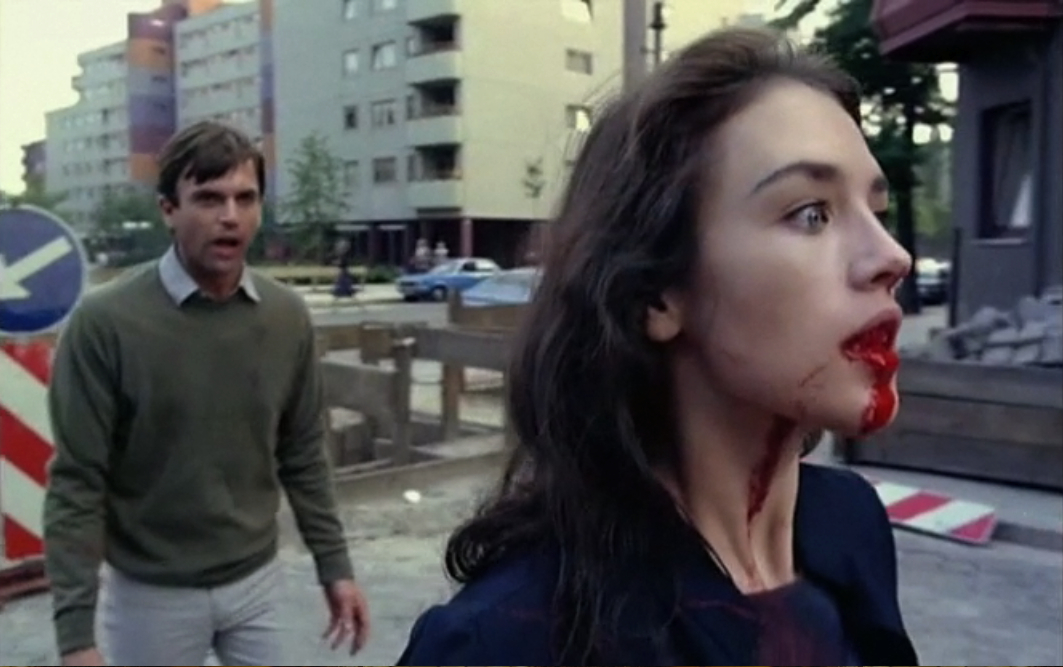Bleeding from Their Mouths:
A Conversation with Jon Leidecker on Zulawski's POSSESSION
by Eilish Cullen
12 Sep 2012
NOTE: Jon (Wobbly) Leidecker performs live with Freddy McGuire for OTHER CINEMA’s Optronica show on Saturday, November 10, 2012!

On October 27, 2010 at the Polish Club in San Francisco, I had the pleasure of watching Andrzej Zulawski’s POSSESSION (1981) for the first time. I was transfixed by the film’s themes of alienation, otherness, hysteria, ruptured love, and omnipresent political turmoil. This summer, with Jon Leidecker, I watched my second film by Zulawski, Limpet Love, and afterwards we began to discuss a mutual love and respect for the Polish director’s film work. LIMPET LOVE left a similar indelible impression on me; it’s a masterly crafted whirling dervish of gutted emotion loosely inspired by Dostoevsky’s The Idiot. As there seems to be a renewed interest in his films, evidenced by recent retrospectives mounted in New York and Los Angeles showcasing his oeuvre, I thought it would be interesting to peel apart some of what sparked our interest in Possession and has us craving more. What follows is a Q&A that took place over lunch and subsequent emails this summer.
EILISH CULLEN: What was your first introduction to Zulawski’s work? Given your background in experimental sound and collage music, I’m curious what it was about his films that sparked your interest?
JON LEIDECKER: In the late ‘90s, my friend Peter Conheim loaned me a third generation VHS dub of the film, and it was clear that it was something special.
EC: Why do you think POSSESSION is his most accessible film and how can it serve as an entry point into his other work?
JL: Well, most everyone can relate to a breakup story, but this is also probably his most personal film; he’s talked about how many of the scenes were transcribed directly from the stages of his own divorce. But even as the film veers off into truly fantastic gothic horror, and starts showing you things that couldn’t possibly be real, the events aren’t really being presented as metaphor—everything is very graphic and literal. His films often feel like extended dream sequences, but he never, ever resorts to the common technique of a character waking up from one and wondering what was real—his characters are never hallucinating, everything you see is actually happening to them. The narrators never turn out to be “Unreliable Narrators” no matter how insane their environments become.
You either connect with it [POSSESSION] or you are entirely repulsed by it, usually within the first five minutes—Jon Leidecker
EC: Can you define the term genre splicing and discuss how Zulawski employs this approach in his film work and in POSSESSION specifically?
JL: POSSESSION is frequently taken for an incompetent film by many American viewers on the first watch, even the ones that love it aren’t sure if it’s exactly “good” or not. It’s not just the extreme acting; even though it begins in high gear, for the first half hour it plays out as a reality-bound European arthouse drama before making a hyperbolic curve into being a flat-out horror movie with a mid-range budget. It can seem to some viewers like simple incoherence. But on a second viewing, it’s utterly consistent; the most accurate way to film a divorce is to slowly reveal it as a horror film. The floodgates opened for stigma-free divorce in the Seventies, and a lot of women were simply not content with married life any more; Kramer vs. Kramer may have won the Oscar, but Cronenberg’s THE BROOD and POSSESSION were the two that really tried to sum up the way the terrain had changed by the end of the decade. I can’t name too many films that make a formal point of pivoting from one genre to another at the mid-point in a very calculated way; Miike’s THE AUDITION, some of the recent Pixar films.
EC: Does this style of genre splicing in his film inspire or relate to your sound work in any way?
JL: There is a feeling in his work that absolutely anything could happen at any moment, regardless of any obligation to structure or genre, and yes, it’s as influential as it is terrifying.
